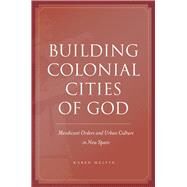Building Colonial Cities of God
, by Melvin, Karen- ISBN: 9780804774864 | 0804774862
- Cover: Hardcover
- Copyright: 2/8/2012
This book tracks New Spain's mendicant orders past their so-called golden age of missions into the ensuing centuries and reveals that they had equally crucial roles in what Melvin terms the "spiritual consolidation" of cities. Beginning in the late sixteenth century, the orders gave new emphasis to work in cities, which became home to the majority of friars and to the orders' wealthiest houses, and where mendicants became deeply embedded in urban social and cultural life. Urban friars ministered to residents of all races and social standings and focused on traditional mendicant activities, serving as preachers, confessors, spiritual directors, alms collectors, educators, scholars, and sponsors of charitable works. Each order brought to this work a distinct identity that informed the messages in its sermons, the images in its churches, and the teachings of its priests. In the process, the orders informed people's beliefs and shaped variations in the practice of Catholicism in New Spain. Contrary to prevailing views, the seventeenth and early eighteenth centuries were a time of prosperity for the mendicants, and even the eighteenth-century reforms that ended this era were nowhere near as devastating as has been assumed. Indeed, the bustle of mendicants' churches and the demand for their services that continued through the end of the colonial period demonstrates a thriving baroque piety.







